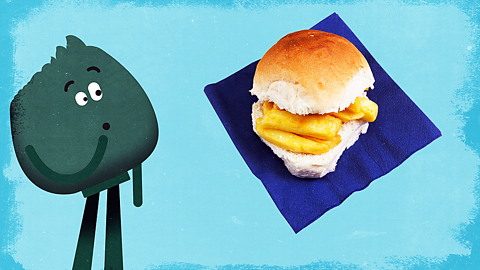Did you know?

Aristotle, the Ancient Greek philosopher, was an expert on structuring arguments to win debates.
In the 4th century BC, Aristotle wrote up his ideas in a collection of essays called Rhetoric.
His work discusses how to use language to persuade and influence others.

Introduction to discussion and debating
Key learning points
- How to express your point of view carefully
- How to listen to your opposition respectfully
- How to defeat the opposition and win the debate by being clear on your topic and creating a successful counter argument
Video about how to win a debate
Watch this heated discussion about dogs and cats to learn some important debating skills
Debater 1: For loyalty and love, you cannot beat a dog âŠ. so today Iâm going to be putting forward my view that dogs make better pets than cats.
Heâs come out of the blocks at pace, using alliterative language. Strong start - the motion is clear.
Debater 2: Dogs are annoying, but cats are great! Today Iâm going to explain why cats rule.
Uh-oh, she started out by rubbishing dogs⊠and then saying cats are âgreatâ without saying WHY. It's a clear rebuttal, but thatâs not an argument! Maybe some statistics, or a quote to support the counter argument might have been a better choice here.
Debater 1: You say that dogs are annoying, but I respectfully disagree. How can a faithful friend who greets you every morning with a cheery bark be annoying?
10 out of 10! Respectfully listening to the other personâs opinion is the first rule of debate and discussion. Itâs a good tactic to elaborate and he does that by responding to the point using a powerful rhetorical question.
Debater 2: Youâre talking utter rubbish! Who wants a smelly mutt slathering saliva all over them before theyâve woken up?
Ouch! Attack the argument, not the person! The rhetorical question, was a good move, and the vivid imagery painted might have put some people off dogs, but this debater still hasnât said anything yet in favour of cats! Bad miow-ve (Clears throat)⊠Bad move.
Debater 1: I take your point: youâre not a morning person? Luckily, there are a variety of dog breeds and some also like to snooze in the morning. I personally love waking up for a walk with my dog!
A counter argument: strategic moves as the debate unfolds. Personal pronouns, anecdotes and imagery â all useful debating tools.
Debater 1: And, in conclusion, I say: if you need a pet, choose a dog. Thereâs a pooch to please everyone!
A memorable alliterative phrase to summarise, what a finish! Iâm sure he must have prepared in advance â it sounded like a well-rehearsed killer move.
Debater 2: I hear what youâre saying but⊠cats are way more popular on social mediaâŠ
She says she hears him but sheâs not actually responding to his argument.
Debater 2: ⊠In conclusion: dog bad, cat good!
Well, I donât think thereâll be a debate about who won here today. A-woof!
How to speak and listen
When presenting an argument or having a discussion or debate, the way you speak and listen is very important.
Arguing, discussing and debating â whatâs the difference?
- An argument is your point of view. The root âargâ means âto shineâ, so you are shining a light on your opinions.
- A discussion involves the sharing of arguments with others. In Latin the word discussion meant 'to shake apart', so you are untangling different opinions.
- The word debate used to mean to 'contend or fight for'. A debate involves using skill to defeat the arguments of the opposition.

ŽĄ°ùŸ±ČőłÙŽÇłÙ±ô±đâs advice for calm debating:
- When presenting your own thoughts, stick to the facts and control emotion.
- When listening to the thoughts of others, listen respectfully and do not dismiss difference as wrong.
- When sharing your values, avoid alienating other people.
Preparing an argument or position

ŽĄ°ùŸ±ČőłÙŽÇłÙ±ô±đâs invention stage is a clever way to prepare your argument where you come up with all the ideas and arguments you can about your topic. Hereâs how it works:
- Be clear on the topic for debate.
Write a statement to sum up the issue to be debated, for example, âSchool uniform should be bannedâ. - Choose your side.
Always choose the side you feel most strongly about as it will make your argument more powerful in the debate. - Lay out the arguments on both sides.
Write out the arguments for both sides of the debate. A good way to do this is using a table.
Hereâs an example table written in response to the statement, âSchool uniform should be bannedâ.
| Agree | Disagree |
|---|---|
| It is uncomfortable | It prevents bullying |
| It is expensive | It gives a collective identity |
| It does not allow for individuality | It can be recycled/reused |
Ìę
Top tips
- Think about other perspectives, for example, teachers, parents, employers to show varied opinions.
- Research the topic to find facts to support each point.

How to show agreement

Think of a debate as being a bridge separating you and someone else on the opposite side. The idea of a debate is to get the person on the other side to come over to your side of the bridge.
Finding common ground is essential - your opposition needs to feel that you understand them and agree with some of their principles. This means you can âmeet in the middleâ and then use your other skills to convince them to join you back over on your side of the bridge.
How to show disagreement

Showing disagreement is difficult as it can be insulting if done badly. A good way to show disagreement is:
Concede + conjunction + fact
- concedeConcede means to allow, agree, or admit. one of their points.
then
- Use a conjunctionsLinking words such as âandâ âbecauseâ âthenâ âhoweverâ. to introduce a counter-argumentAn argument that explains why an opposing viewpoint is incorrect or not very convincing..
then
- Provide a fact to back up your counter argument.
For example, you might say:
| Concede | conjunction | fact |
|---|---|---|
| I agree that vitamins are good for you | but | in a recent study it was suggested that we should limit our intake of vitamin supplements. |
Pre-empting the opposition

Pre-empting means âto take action to prevent something happeningâ and in debate is all about covering the oppositionâs points (and undermining them) before they get the opportunity to make them.
By making a table and thinking about both sides of the argument properly, you will already have an idea of the opposition's arguments, that you can pre-empt.
How to structure your pre-emptions
Structure your points in a way that shows you have thought about their point of view already, that you understand it, but you can help them see an alternative way. Be polite and constructive when talking about their arguments.
Donât say:
I know youâre going to say something about numbers and you can stop right there because Iâve already thought about it.Do say:
I understand that you believed that the numbers are important in this argument, however I would like to suggest thatâŠ
Test your knowledge
Play Bitesize secondary games. gamePlay Bitesize secondary games
Have fun playing science, maths, history, geography and language games.

More on Spoken English
Find out more by working through a topic
- count2 of 5

- count3 of 5

- count4 of 5

- count5 of 5
